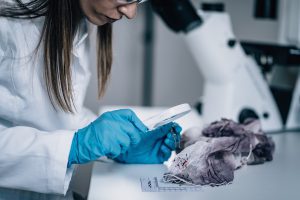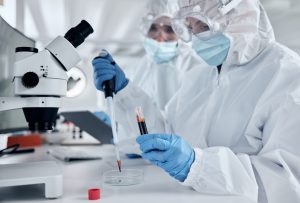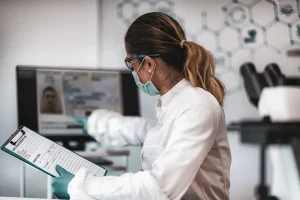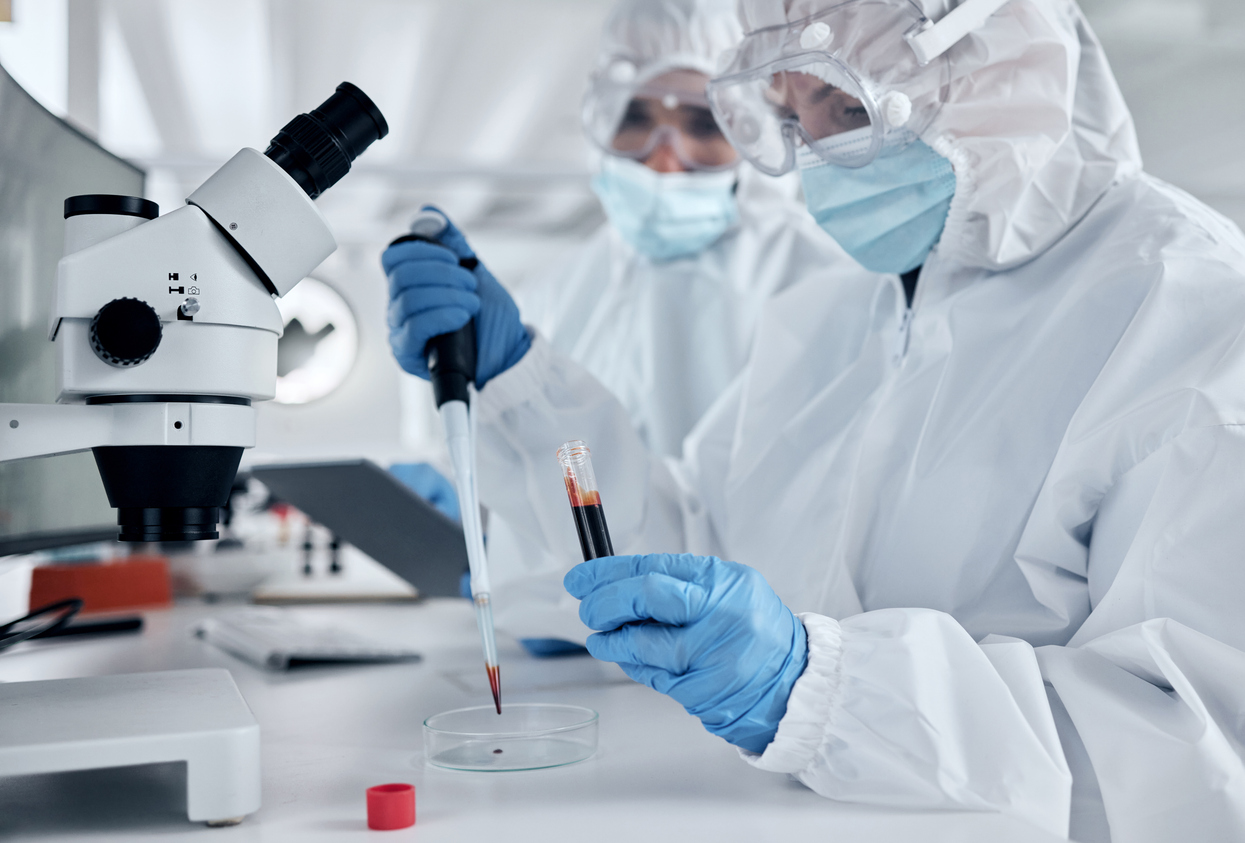Understanding how to become a forensic scientist involves earning a bachelor’s degree in a relevant science field and gaining hands-on lab experience through internships or part-time jobs. Additionally, pursuing specialized education or certification can enhance your expertise and improve your job prospects in this evolving field.
What Are the Main Types of Forensic Scientists?

Forensic scientists use their knowledge and skills to solve crimes through scientific techniques. Forensic science applies various scientific disciplines to crimes and related legal issues. Forensic scientists assist law enforcement and legal professionals with criminal investigations, expert testimony, and analysis of physical evidence related to crimes.
There are many different types of forensic scientists, each specialising in distinct areas. Here are the main types:
- Forensic Chemist: A forensic chemist studies chemical substances found at a crime scene, such as drugs, toxic poisons, or other unknown substances. They determine if illegal drugs or poisons were used in a crime.
- Forensic Biologist: Forensic biologists analyse biological evidence, such as blood, hair, or DNA. They perform DNA profiling, analyse bodily fluids, and study biological materials to identify suspects or victims and determine the circumstances of a crime.
- Forensic Toxicologist: These specialists are trained to identify poisons, drugs, and alcohol within bodily fluids or tissues. They are typically involved in cases of overdose, poisoning, or driving under the influence.
- Forensic Anthropologist: Forensic anthropologists study human skeletal remains to determine a person’s identity, the cause of their death, and the manner of their death. They work on cases involving unidentified human remains.
- Forensic Odontologist: Odontologists (dentists) study dental records and bite-mark evidence to help identify unidentified human remains or link a suspect to a crime, especially in cases where human bodies are so severely burned that little remains to identify them.
- Forensic Pathologist: A forensic pathologist or medical examiner determines the cause of death for individuals who have died under suspicious or unexplained circumstances. They perform autopsies and examine injuries and tissue samples to explain precisely how a person died.
- Forensic Entomologist: Forensic entomologists study insects that feed on decomposing bodies and use that information to estimate the time of death. They can identify insect species and use their knowledge of insect life cycles to estimate how long a body has been at a particular environmental temperature and humidity.
- Digital Forensic Scientists: These specialists examine electronic devices such as computers, mobile phones, and hard drives to recover evidence, such as deleted data, or to track cybercrime and digital communications involved in cases of hacking, fraud, or online exploitation of children or teenagers.
- Ballistics Expert: Ballistics experts analyse firearms, bullets, and cartridge cases to link bullets or weapons to crimes, determine the trajectory of a shot, or identify the type of firearm used to commit a crime.
- Forensic Document Examiner: These specialists study handwriting, signatures, ink, and paper to detect whether documents have been forged or altered. They work on cases of forgery and fraud and examine legal documents.
What Does a Forensic Scientist Do?
Forensic science is a crucial part of the legal system because forensic scientists analyse the evidence gathered at crime scenes to help police officers and legal professionals solve crimes and convict criminals. This essay describes a typical day in the life of a forensic scientist and the duties of a forensic scientist.
Overall, the following steps are involved:
- Gather and Preserve Evidence: Forensic scientists are often among the first responders at a crime scene, gathering physical evidence and ensuring that it is preserved, documented, and shipped to the lab without contamination or alteration.
- Examine Physical Evidence: Forensic scientists have an essential role in analysing the evidence collected at a crime scene. This can include DNA testing, fingerprint analysis, blood spatter interpretation, or chemical analyses.
- Write Reports: After analysing evidence, forensic scientists prepare reports explaining their findings. These reports must be thorough and accurate, written to be understandable to non-scientists, including police officers, lawyers, judges, and juries.
- Testify in Court: Forensic scientists are sometimes called upon to testify as expert witnesses. They present their findings, describe the scientific methods employed, and offer expert opinions about how the evidence fits into the case.
- Work Alongside Police: Forensic scientists work closely with police officers, detectives, and legal officials to solve crimes. They assist these professionals by gathering scientific evidence about cases, such as identifying suspects, establishing timelines, and linking individuals to crime scenes.
- Keep Laboratory Equipment in Good Condition: Forensic scientists must ensure that laboratory equipment is calibrated and in good working order. They use a wide variety of specialised tools, including microscopes, DNA sequencers, and chromatography machines, to conduct tests on evidence.
- Keep Up to Date on Scientific Advances: Many forensic scientists work within specific laboratories in law enforcement. However, forensic science is a growing and changing field, with new technologies and methodologies emerging constantly. Forensic scientists must stay abreast of the latest research, tools, and techniques to keep their work relevant.
- Reconstruct Crime Scenes: Forensic scientists sometimes reconstruct crime scenes. They might analyse patterns of blood spatter to determine how a murder victim was wounded or use bullet trajectories to recreate a high-speed chase.
- Swear on Chain of Custody: At trial, the forensic scientist provides testimony about how the evidence was collected, stored, transported, and analysed to establish the chain of custody—an unbroken record of possession ensuring that the evidence presented in court has not been tampered with.
- Varied Work Settings: Forensic scientists may work in various settings, such as crime scenes, laboratories, courtrooms, and police departments. Their work is both field-based and lab-based, depending on their specialisation.
Average Forensic Scientist Salary

There are many different salaries for forensic scientists in the UK, depending on their experience, specialisation, and whether they work in the public or private sector. Forensic scientists working for the government or police typically have their salaries structured on a pay scale. Here are some typical salaries for forensic scientists:
- Entry-Level Forensic Scientist: The starting salary for a forensic scientist is likely to be in the region of £20,000 to £30,000 a year. These workers may be assistants or technicians within a laboratory and will be learning how to handle evidence.
- Mid-Level Forensic Scientist: With experience, a forensic scientist can earn between £30,000 and £45,000 per year. They may be asked to take on greater responsibilities in the lab, manage cases, or provide support in court.
- Senior Forensic Scientist: Experienced senior forensic scientists, or those working in specialist areas, earn between £45,000 and £60,000 per year. They may manage forensic teams, lead laboratories, or work on high-profile criminal cases.
- Private Sector Forensic Scientist: Forensic scientists in the private sector, especially in desirable areas such as digital forensics or private investigation, are usually paid more. Depending on the case, a forensic scientist can earn £50,000 or more annually.
- Bonuses and Extra Stipends: Forensic scientists might receive bonuses or extra stipends for providing expert testimony in court or working as consultants for private companies or law enforcement agencies.
Essential Skills of a Forensic Scientist
Forensic scientists must possess a deep knowledge of science, a wide range of technical skills, and a keen attention to detail. These are the skills required to be a forensic scientist:
- Strong Analytical Skills: Forensic scientists must have excellent analytical abilities, allowing them to reason logically. They need to make sense of complex data and draw conclusions from the evidence. For instance, they may analyse chemical compounds or match DNA profiles.
- Attention to Detail: This job revolves around the small details. Evidence that appears insignificant to the inexperienced eye can be crucial in a given case. A forensic scientist’s ability to focus on detail is essential for detecting and not missing important clues.
- Technical Abilities: The primary work of forensic scientists is conducted in the laboratory. They utilise equipment such as DNA sequencers, chromatographs, and mass spectrometers. Proficiency in using this equipment and interpreting the results is vital.
- Communication Skills: Forensic scientists must possess strong communication skills, as they frequently present their work at scientific conferences and explain their findings in court as expert witnesses. This requires the ability to simplify scientific concepts for laypeople.
- Objectivity and Impartiality: Forensic scientists must be objective, avoiding influence from personal opinions or external pressures. Their conclusions should be based solely on scientific evidence, free from bias.
- Problem-solving Skills: Conducting complex casework often requires unconventional solutions. Whether determining the cause of death in a suspected homicide or identifying an unknown material, forensic scientists need solid problem-solving abilities to navigate challenges.
- Teamwork and Collaboration: Forensic scientists often work as part of a larger team, alongside investigating police officers, lawyers, and other forensic professionals. Good teamwork and collaboration skills are essential for coordinating investigations and sharing information.
- Legal and Ethical Guidelines: Knowledge of the legal and ethical guidelines relevant to forensic science is crucial. This includes the ability to provide testimony concerning evidence and the application of forensic science in law enforcement contexts.
- Time Management: Forensic scientists frequently work to tight deadlines, especially during live criminal investigations. Good timekeeping is essential to ensure that work is completed promptly and findings are delivered to law enforcement or legal teams on time.
- Adaptability and Continuous Learning: Forensic science is an ever-evolving field. New technologies and methods are regularly introduced, and forensic scientists must stay current and adapt to the latest advancements.
Tips For Forensic Scientists

With over 38 years of experience in forensic science, We would like to share some practical advice for those considering a career in this field. Although my primary focus has been pharmacology, many of these insights apply broadly across various areas of forensic science. My aim is to assist aspiring scientists on their journey to becoming successful professionals.
First and foremost, it’s crucial to pursue your passion. Identifying a specific area of forensic science that excites you will help you remain motivated and focused. The path to becoming a forensic scientist can be challenging and demands considerable dedication and effort. However, if you are passionate about your chosen field, the journey will be much more enjoyable.
Another important piece of advice for students in forensic science is to stay updated on current events. Having a solid understanding of the world around you will enhance your ability to contribute meaningfully to the field. Remember, forensic science involves not just analysing evidence but also solving real-world cases. Being engaged with current affairs is vital for success.
Moreover, constantly challenge yourself and seek new experiences. This entails asking questions, conducting research, and questioning established norms. As a professional in forensics, ongoing learning is essential to enhancing your skills and knowledge.
To succeed as a forensic scientist, enthusiasm, awareness, and a commitment to lifelong learning are key. While it can be a demanding career path, it is also highly rewarding.
- Gain Laboratory Experience: Take advantage of opportunities in school to gain hands-on experience in a lab setting. Internships, volunteering, or part-time lab work will equip you with practical skills in forensic techniques and equipment, making you a more competitive candidate for entry-level roles.
- Develop a Focused Skill Set: Forensics is a broad discipline, so it’s important to cultivate specialised skills in areas such as genetic fingerprinting, drug recognition, or ballistics analysis to distinguish yourself.
- Stay Updated with Tools and Technologies: The field of forensic science is continually evolving, with new tools and techniques emerging regularly. Keep abreast of these developments by attending workshops, reading relevant journals, or enrolling in continuing education courses.
- Practice Clear and Precise Writing: Forensic scientists must write numerous reports, often used in court. Your reports need to be detailed, organised, and easy to understand, so practice summarising lab results and forensic cases effectively.
- Build a Professional Network: Participate in forensic science conferences, workshops, or seminars to connect with professionals in the field. Networking can provide insights into job openings, new research, and emerging trends. Joining organisations like the Chartered Society of Forensic Sciences can help expand your professional connections.
- Obtain Certification: Depending on your area of focus, it’s advisable to seek recognition from a professional body, such as the Chartered Society of Forensic Sciences. This is particularly important if you aim to serve as an expert witness or pursue higher-level positions.
- Enhance Public Speaking Skills: As expert witnesses, forensic scientists often testify in court about their findings. Developing public speaking skills will help you confidently communicate scientific concepts in legal settings.
- Understand the Legal System: Familiarising yourself with the fundamental rules of the legal system will help you navigate interactions with law enforcement officers, lawyers, and judges involved in your cases. Learn courtroom terminology, procedures, and the standards for the admissibility of forensic evidence.
Forensic Scientist Requirements
Becoming a forensic scientist in the UK involves years of formal education, practical experience, skills training, and obtaining essential qualifications. Here’s what you need to do to pursue a career as a forensic scientist:
- Bachelor’s Degree in a Science Field: A bachelor’s degree in a science field is essential for a forensic scientist. Forensic scientists can study subjects such as forensic science, biology, chemistry, biochemistry, or other related fields. A science degree prepares individuals with knowledge of scientific theories and techniques.
- Specific Forensic Science Degree: Many aspiring forensic scientists choose to pursue a degree in forensic science. These specialised programmes teach students how to apply science to criminal investigations, providing hands-on experience with the tools and methodologies used in forensic analysis.
- Relevant Postgraduate Degree: Occasionally, employers may require candidates to hold a postgraduate degree, especially for specialised positions such as forensic anthropology or forensic toxicology. A master’s degree in forensic science or a related field enables you to develop expertise in a particular area of forensic analysis.
- Practical Laboratory Experience: The ideal candidate for a career in forensic science should be ‘hands-on’, and that’s where the ‘R’ in STEM becomes invaluable. You can gain practical skills through internships, volunteer work, or employment in research labs while studying. This experience helps you become proficient in using instruments, lab techniques, and data analysis.
- Strong Familiarity with the Criminal Justice System: While forensic scientists are not legal professionals, they need a basic understanding of the criminal justice system, including how it operates (e.g., legal procedures), how evidence is collected and transported (e.g., chain of custody), and how forensic evidence is presented in court.
- Professional Certification: Although not always required, obtaining professional certification can enhance your job prospects and demonstrate your commitment to the profession and adherence to industry standards, such as those set by The Chartered Society of Forensic Sciences.
- Attention to Ethical and Legal Standards: Forensic scientists must adhere to strict legal and ethical standards when handling evidence and presenting findings in court. Maintaining these standards is critical for the integrity of your work and ensuring that your findings are admissible.
How to Become a Forensic Scientist

Becoming a forensic scientist is a long journey that involves the right education, qualifications for a forensic scientist, training, and experience. Here’s a step-by-step guide to help you achieve your goal of becoming a forensic scientist for the police in the UK:
- Earn a Bachelor’s Degree in a Science Field: Begin by earning a Bachelor of Science degree in forensic science or a related field, such as biology, chemistry, or biochemistry. A bachelor’s degree is essential for starting your career.
- Specialised Education: If you have a particular interest in a specific area of forensic science (e.g., toxicology, DNA analysis, digital forensics), you can pursue specialised education through a master’s degree or additional coursework.
- Gain Hands-On Lab Experience: Aim to acquire practical experience in a laboratory, either during your studies or after completing your degree. Consider seeking internships or part-time positions at research laboratories to become familiar with the equipment and techniques used in forensic analysis.
- Consider Certification: While certification is not mandatory, obtaining credentials from professional organisations, such as the Chartered Society of Forensic Sciences, can enhance your job prospects. Certification demonstrates your competence and dedication to the field.
- Apply for Forensic Science Positions: Once you have completed your education and gained relevant experience, you can apply for forensic science roles. Look for opportunities with law enforcement agencies, forensic laboratories, or private companies that offer forensic services.
- Continuous Professional Development: Forensics is a rapidly evolving field. To succeed, you need to stay updated on new techniques, tools, and research. Attend workshops, conferences, and training sessions regularly.
- Become an Expert Witness: If you have significant experience, you may be called upon to testify in court regarding your forensic findings. Being an effective expert witness requires clear communication of your findings to a judge or jury, as well as familiarity with courtroom procedures and protocols.
Get Qualified as a Forensic Scientist
Forensic Science Essentials, Certificate in Forensic Science, Level 3 Forensic Scientist Course, Forensic Science Overview
Frequently Asked Questions
Why Should You Be a Forensic Scientist?
Forensics is a profession that allows you to apply your scientific training to help deliver justice by prosecuting the guilty and exonerating the innocent. It’s a rewarding way to utilise your scientific expertise, combining science, problem-solving, and law to serve justice through evidence.
Is Being a Forensic Scientist a Good Career Choice for You?
Forensic science could be an excellent career if you have a passion for science, enjoy solving puzzles, and are interested in criminal justice. The field is popular, fascinating, dynamic, and continually expanding, with specialisations ranging from DNA analysis to digital forensics.
Forensic Scientist Salaries
Salaries for forensic scientists in the UK vary based on experience, specialism, and location. Graduate forensic scientists typically earn between £20,000 and £30,000 per year, while more senior forensic scientists can earn up to £60,000 or more, particularly in private practice.
Which Qualifications Can Help with a Career as a Forensic Scientist?
To pursue a career in forensic science, you will need a bachelor’s degree in a relevant scientific subject. For specific roles, particularly in toxicology or digital forensics, a postgraduate degree may be required. Professional bodies such as the Chartered Society of Forensic Sciences offer additional certification that can enhance your qualifications.
Do I Need to Be an Experienced Scientist to Get Started?
No, you don’t need extensive experience, but you do need a relevant science degree and essential laboratory experience. An internship, volunteering position, or part-time job in a research laboratory will provide you with the practical skills necessary to build a foundation for a career in forensic science.
Forensic Scientist Career Outlook
The demand for forensic scientists is likely to remain stable in the foreseeable future as new technologies and forensic techniques continue to be developed. Given the increasing importance of DNA evidence, digital forensics, and other scientific methods in criminal investigations, forensic scientists will remain essential for solving crimes and achieving justice.
Forensic Scientist Hierarchy and Progressing Within the Role
In the field of forensic science, there is generally a career path that begins with entry-level positions—such as forensic lab technicians or forensic assistants—leading to more senior roles, such as forensic analysts or senior scientists. With experience, there are also opportunities to progress into management or specialised positions in niche areas of forensic science, such as ballistics or forensic anthropology.
Forensic Scientist Exit Options and Opportunities
Forensic scientists have several exit routes, including academic research or law enforcement roles. Many forensic scientists also transition into other positions, such as expert consultancy or private investigation, utilising their forensic skills in new contexts.


